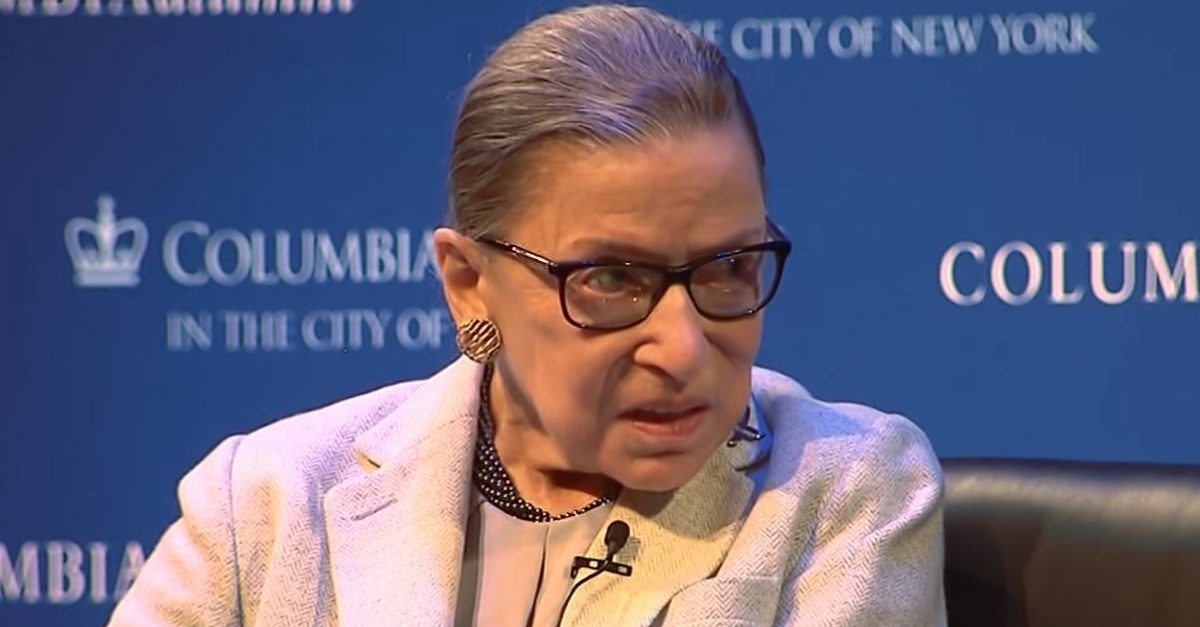
President Donald Trump asked the Supreme Court to intervene in a third lawsuit aimed at obtaining his tax returns and other financial documents. Earlier this week, two separate financial institutions were ordered by a federal court to comply with subpoenas issued by the House Intelligence and Financial Services Committees.
Supreme Court Justice Ruth Bader Ginsburg handled the petition because such emergency requests in New York State are routed through her office as a matter of standard high court procedure.
“The committees’ desire to use the president, his family, and his businesses as a case study is not a ‘legitimate legislative purpose,'” the 45th president argued in a 240-page filing submitted late Friday. “It is an attempt to exercise executive power beyond Congress’s legislative reach and to expose Applicants’ private records ‘for the sake of exposure.'”
Congress, however, has argued that their interest in Trump’s tax returns bears directly upon such legitimate legislative purposes due to planned and filed legislation and other discussions occurring at the congressional level–including investigations into whether or not the president committed fraud by inflating his assets on official forms or if he violated campaign finance law by authorizing hush money payments by way of his former friend and attorney Michael Cohen.
Additional congressional concerns have to do with whether the president, his business–and his family–may have engaged in or otherwise had anything to do with money laundering.
Several lower courts so far have agreed with congressional investigators and ordered both Deutsche Bank AG and Capital One Financial Corp. to comply with the document production requests.
On December 3, a three-judge panel on the Second Circuit demanded the banks produce the relevant documents and that they “be promptly transmitted to the Committees in daily batches as they are assembled, beginning seven days from the date of the opinion.” Such compliance was to begin “forthwith.”
The president’s emergency petition–and its almost immediate (though temporary) disposition means that clock has now been stalled.
In the filing, the president’s attorneys repeatedly bemoan the broad and deep nature of those congressional subpoenas.
“The second and third subpoenas are identical,” the petition notes. “Both are issued to Deutsche Bank AG—one by the Financial Services Committee and one by the Intelligence Committee. These subpoenas are even broader than the Capital One subpoena. They demand information about seven business entities, as well as the personal accounts of not only the President, but also Donald Trump Jr., Eric Trump, and Ivanka Trump.”
The filing continues:
The Committees also demand account records for all of the named individuals’ immediate families—meaning their spouses and minor children (and, in the President’s case, his grandchildren). The subpoenas cover any “trustee, settler or grantor, beneficiary, or beneficial owner” of each account, as well as “any current or former employee officer, director, shareholder, partner, member, consultant, senior manager, manager, senior associate, staff employee, independent contractor, agent, attorney or other representative.” And they seek these records for a time period of at least ten years (dating back to January 1, 2010); some requests have no time limitation at all.
Late Friday, Justice Ginsburg put a temporary administrative hold on the lower court’s ruling:
University of Texas Law Professor Steve Vladeck explained:
Justice Ruth Bader Ginsburg has issued a temporary (or “administrative”) stay of the congressional subpoenas to Deutsche Bank & Capital One for long enough to allow the full #SCOTUS to consider whether to freeze the subpoenas pending consideration of @realDonaldTrump’s appeal: pic.twitter.com/pC6N0i7ELK
— Steve Vladeck (@steve_vladeck) December 6, 2019
The full Supreme Court will likely take up the case along with two other Trump tax returns cases already submitted. The full emergency petition is available below:
Trump v. Deutsche Bank by Law&Crime on Scribd
[image via screengrab/CNN]